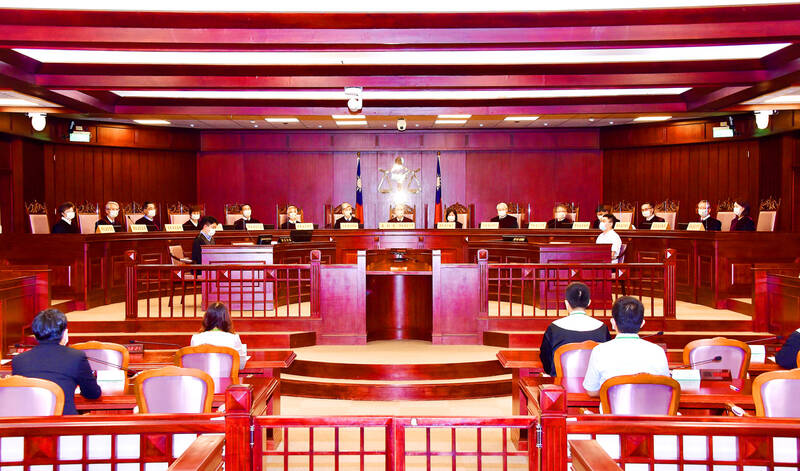The Constitutional Court is to hear arguments tomorrow on whether an article in the Civil Code limiting the circumstances in which couples can file for divorce contravenes the Constitution’s protection of individual freedoms.
The case relates to Clause 2, Article 1052 of the Civil Code, which states that a husband or wife can petition for divorce upon the occurrence of an event that renders it difficult to maintain the marriage.
However, if only one party is “responsible for the event,” then “only the other party may petition for divorce,” the clause says.

Photo: Tu Chien-jung, Taipei Times
Kaohsiung Juvenile and Family Court Judge Chu Cheng-kun (朱政坤) applied for the constitutional interpretation based on three cases that are before him.
Chu said that the clause contravenes the right to divorce as protected under Article 22 of the Republic of China Constitution, and also contradicts previous rulings by the court, including Interpretation No. 791, which decriminalized adultery.
In addition to limiting people’s freedom to end a relationship, the law also has the practical effect of devaluing marriage by allowing it to be used to “trap” individuals in relationships that only exist in official documents, Chu said.
A case coclaimant surnamed Fang (方) has been unable to divorce a woman he married more than 50 years ago, even though he has since raised three children with another woman in Hong Kong.
Fang said that the law has found him to be “responsible” for the difficulties in his marriage and was deemed ineligible to file for divorce.
The law is to be defended in the case by the Ministry of Justice.
Previously, the ministry has said that in cases where an event has made it difficult to maintain a marriage, both parties are often found responsible and thus have sufficient grounds for divorce.
It has also said that any potential amendments to the law should be left to the Legislative Yuan and not be decided by the courts.
Arguments in the case are to be heard starting at 9:30am tomorrow.
The proceedings are to be open to the public and broadcast live on the Internet.

Chinese Nationalist Party (KMT) Chairman Eric Chu (朱立倫), spokeswoman Yang Chih-yu (楊智伃) and Legislator Hsieh Lung-chieh (謝龍介) would be summoned by police for questioning for leading an illegal assembly on Thursday evening last week, Minister of the Interior Liu Shyh-fang (劉世芳) said today. The three KMT officials led an assembly outside the Taipei City Prosecutors’ Office, a restricted area where public assembly is not allowed, protesting the questioning of several KMT staff and searches of KMT headquarters and offices in a recall petition forgery case. Chu, Yang and Hsieh are all suspected of contravening the Assembly and Parade Act (集會遊行法) by holding

PRAISE: Japanese visitor Takashi Kubota said the Taiwanese temple architecture images showcased in the AI Art Gallery were the most impressive displays he saw Taiwan does not have an official pavilion at the World Expo in Osaka, Japan, because of its diplomatic predicament, but the government-backed Tech World pavilion is drawing interest with its unique recreations of works by Taiwanese artists. The pavilion features an artificial intelligence (AI)-based art gallery showcasing works of famous Taiwanese artists from the Japanese colonial period using innovative technologies. Among its main simulated displays are Eastern gouache paintings by Chen Chin (陳進), Lin Yu-shan (林玉山) and Kuo Hsueh-hu (郭雪湖), who were the three young Taiwanese painters selected for the East Asian Painting exhibition in 1927. Gouache is a water-based

Taiwan would welcome the return of Honduras as a diplomatic ally if its next president decides to make such a move, Minister of Foreign Affairs Lin Chia-lung (林佳龍) said yesterday. “Of course, we would welcome Honduras if they want to restore diplomatic ties with Taiwan after their elections,” Lin said at a meeting of the legislature’s Foreign Affairs and National Defense Committee, when asked to comment on statements made by two of the three Honduran presidential candidates during the presidential campaign in the Central American country. Taiwan is paying close attention to the region as a whole in the wake of a

OFF-TARGET: More than 30,000 participants were expected to take part in the Games next month, but only 6,550 foreign and 19,400 Taiwanese athletes have registered Taipei city councilors yesterday blasted the organizers of next month’s World Masters Games over sudden timetable and venue changes, which they said have caused thousands of participants to back out of the international sporting event, among other organizational issues. They also cited visa delays and political interference by China as reasons many foreign athletes are requesting refunds for the event, to be held from May 17 to 30. Jointly organized by the Taipei and New Taipei City governments, the games have been rocked by numerous controversies since preparations began in 2020. Taipei City Councilor Lin Yen-feng (林延鳳) said yesterday that new measures by